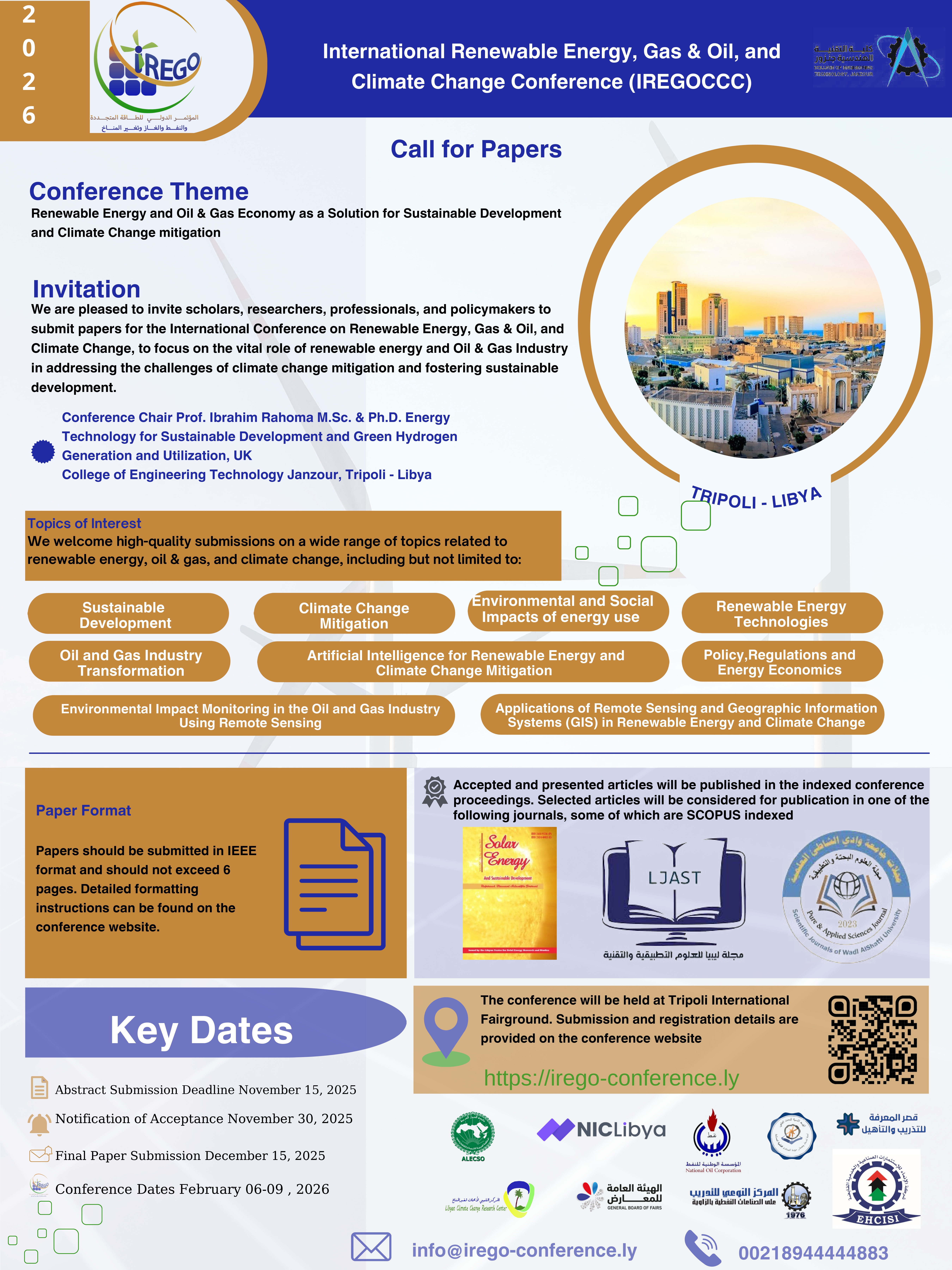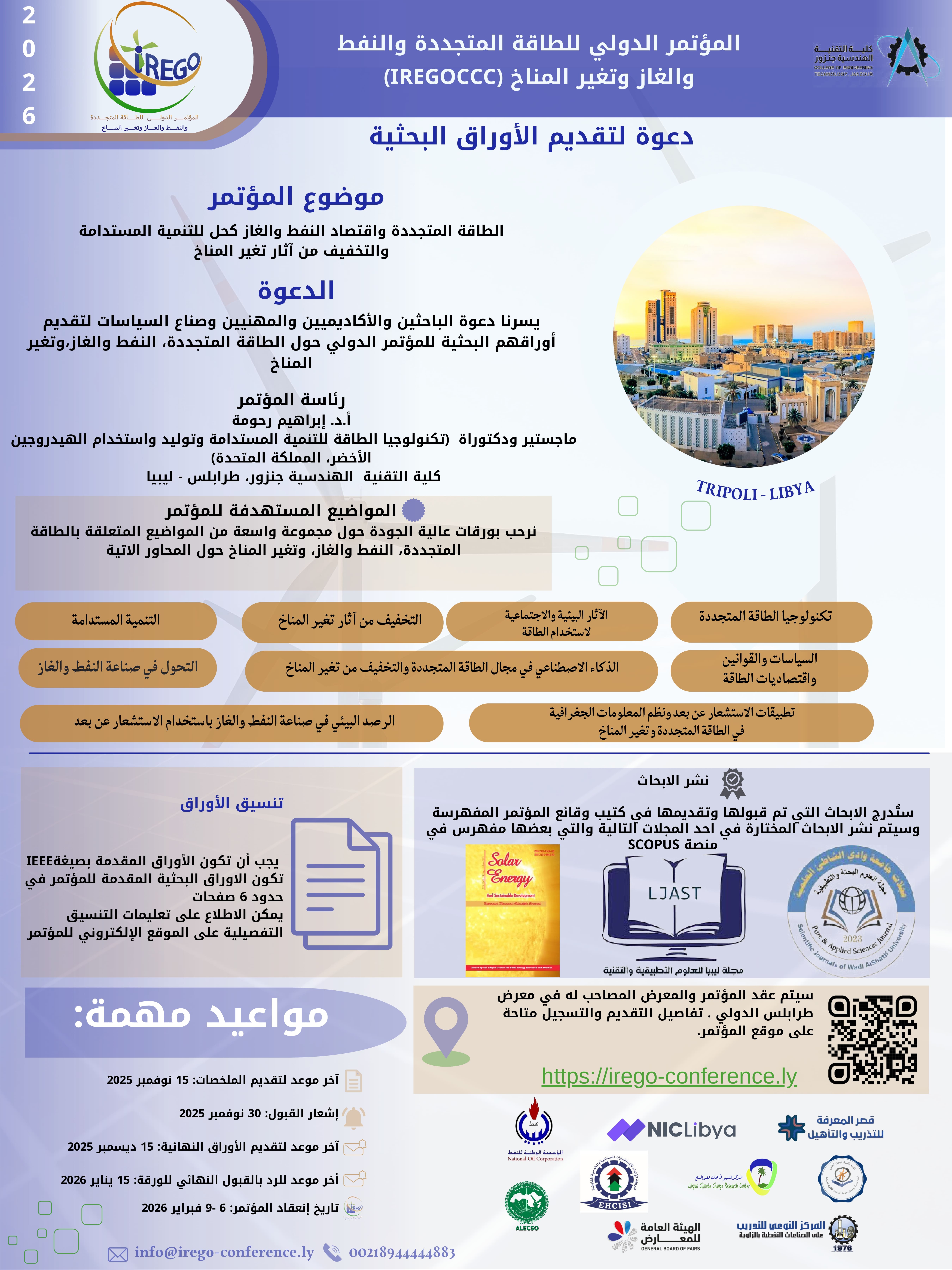International Renewable Energy, Gas & Oil, and
Climate
Change Conference
Theme: Renewable Energy and
Oil
& Gas Economy as a Solution for Sustainable Development and Climate Change Mitigation
We are pleased to invite scholars, researchers,
professionals, and policymakers to submit papers for the 1st International Conference on Renewable Energy,
Gas &
Oil, and Climate Change, focused on the vital role of renewable energy in addressing the challenges of
climate
change mitigation and fostering sustainable development.
Conference Overview
As the global community challenging the pressing
issues
of climate change, the transition to sustainable clean energy systems has become an essential priority.
Renewable
energy sources, including solar, wind, hydro, and geothermal, offer a path toward mitigating the
environmental
impacts of fossil fuels, while also ensuring energy security and economic development. This conference aims
to
explore how renewable energy can serve as a viable solution for reducing greenhouse gas emissions,
decarbonizing
industries, and supporting global efforts toward the achievement of the Sustainable Development Goals
(SDGs).
Topics of Interest
Renewable Energy Technologies:
- Solar, wind, hydro, geothermal, and biomass energy
- Green hydrogen and alternative fuels
- Technological advancements in energy storage and grid integration
- Innovations in energy efficiency and smart grids
Climate Change Mitigation:
- The role of renewable energy in reducing carbon footprints
- Strategies for achieving net-zero emissions
- Climate change adaptation and resilience through energy transition
Sustainable Development:
- The impact of renewable energy on achieving the SDGs
- Renewable energy policies and their socio-economic implications
- Energy access and equity in the context of sustainable development

English

Arabic
Oil and Gas Industry Transformation:
- Transitioning from fossil fuels to clean energy
- The future of oil and gas industries in a low-carbon economy
- Circular economy approaches in oil and gas operations
Policy, Economics, and Regulation:
- Energy policy and regulatory frameworks to promote renewable energy
- Financing mechanisms for renewable energy and climate change projects
- International cooperation and climate agreements for low-carbon energy transitions
Environmental and Social Impacts:
- Environmental sustainability and biodiversity conservation
- Social acceptance and community engagement in green energy projects
- The role of public and private sectors in fostering green energy adoption
Applications of Remote Sensing and Geographic Information Systems (GIS) in Renewable Energy and
Climate
Change:
- Utilizing remote sensing technologies to monitor natural resources and assess optimal sites for
solar and
wind energy projects.
- Employing GIS to analyze spatial data and design maps to support decision-making in sustainable
energy
projects
- Integrating remote sensing and GIS to track the impact of climate change on energy resources and
adapt to
related challenges.
- Enhancing the efficiency and sustainability of renewable energy projects through these
technologies
Environmental Impact Monitoring in the Oil and Gas Industry Using Remote Sensing:
- Using satellite imagery and remote sensing to track environmental changes caused by oil and gas
operations.
- Identifying and managing oil spills, land degradation, and pollution.
- Assessing the effectiveness of mitigation measures and ensuring compliance with environmental
regulations.
- Supporting sustainable practices in the industry through continuous monitoring.
Artificial Intelligence for Renewable Energy and Climate Change Mitigation:
- Machine learning for energy forecasting (solar, wind, hydro).
- AI applications in predictive maintenance and performance enhancement of renewable energy
systems.
- Integration of AI with IoT for real-time energy monitoring for efficient grid operation.
- AI-based analysis of energy policies and economic impacts.
- Machine learning models for climate risk assessment, monitoring, and reducing greenhouse gas
emissions.
- AI-assisted weather and climate forecasting for green energy planning.
Submission Guidelines
Authors are invited to submit original, unpublished
papers related to the conference themes. Submissions may include research findings, case studies, technical
reviews, and conceptual papers. All submissions will undergo a peer-review process to ensure the highest
quality.
• Abstract Submission Deadline: November 15, 2025
• Notification of Acceptance: November 30, 2025
• Final Paper Submission: December 15, 2025
Paper Format
Papers should be submitted in IEEE
format and
should not exceed 6 pages.
Key Dates
- Abstract Submission Deadline: November 15, 2025
- Notification of Acceptance: November 30, 2025
- Final Paper Submission: December 15, 2025
- Conference Dates: February 10-11, 2026
Conference Venue and Registration
The conference will be held at Tripoli International Fairground.
Submission and registration details are provided on the conference website: https://irego-conference.ly
We look forward to your valuable contributions to
this
valuable event on renewable energy and its role in addressing climate change and achieving sustainable
development
goals.



